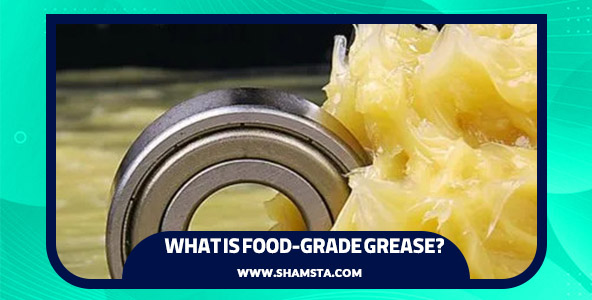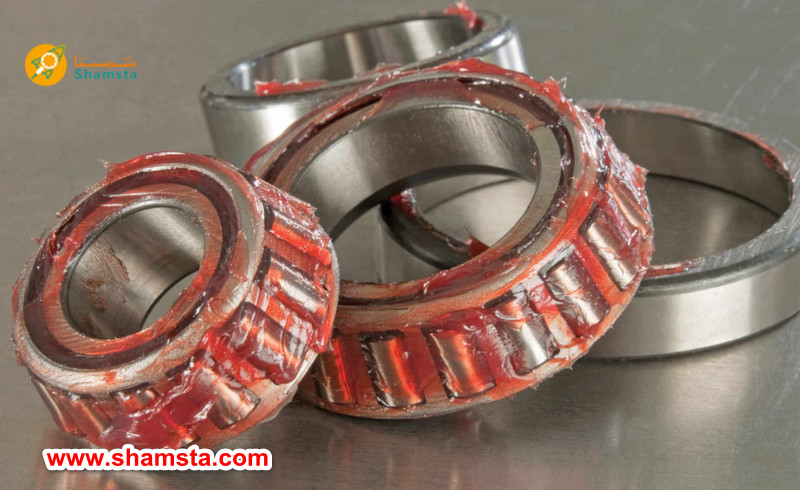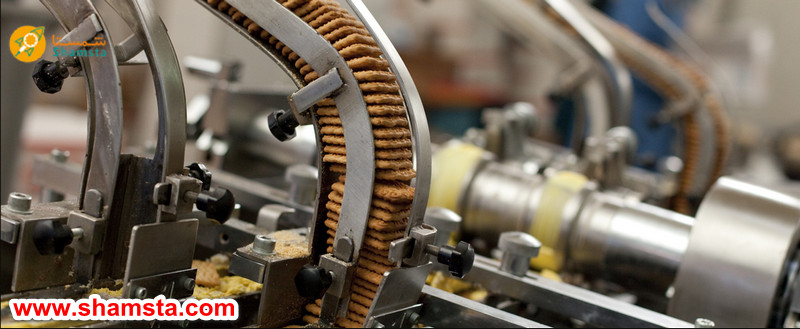
Food-grade greases are semi-solid or solid substances made from mineral or synthetic oils, metal soaps, and other additives. They are used to reduce friction and wear between moving surfaces. These greases are used in a wide range of applications, including bearings, gears, chains, and joints. This grease is also known by various names such as food grease, food lubricant, food-grade grease, food industry grease, food-grade cryogenic grease, food-grade silicone grease, and hygienic grease.
This article covers the following topics:
?What is food-grade grease
Types of food-grade greases
Applications of food-grade grease
Ingredients of food-grade grease
Advantages and disadvantages of food-grade grease
Criteria for selecting the best food-grade grease
How to source different types of food-grade greases from reputable brands
Famous brands of food-grade greases in the world
Food-grade grease is a special type of grease specifically designed for use in the food and pharmaceutical industries. This type of grease must be made from materials that are non-toxic and safe for humans, and it should not transfer any unpleasant taste or odor to food or pharmaceutical products. Industrial food-grade grease is a fatty and lubricating substance used to lubricate and maintain mechanical parts in various equipment and machines. Food-grade grease is often made from animal or vegetable fats and has features such as stability at different temperatures, resistance to pressure, and lubricating properties for use in various industrial conditions. Due to its non-contaminating nature and compliance with hygiene standards, this grease is widely used in industries that handle food products.

: Food-grade greases are classified based on the type of base oil, thickener, and additives. Some common types of food-grade greases include
Mineral Oil-Based Greases: These greases are produced from refined mineral oils and are widely used in the food industry.
Synthetic Oil-Based Greases: These greases are made from synthetic oils and have high resistance to heat and oxidation.
Vegetable Oil-Based Greases: These greases are produced from vegetable oils such as soybean oil, canola oil, and palm oil, and are noted for their environmental compatibility.
Soap-Based Greases: The main thickener in these greases is metal soaps such as lithium soap, sodium soap, and calcium soap.
Non-Soap-Based Greases: The thickener in these greases is non-soap materials such as polyurea, bentonite, and silica.
:Food-grade greases are used in a wide range of equipment in the food and pharmaceutical industries, including
Packaging Machines: For lubricating conveyors, gears, and other moving components.
Mixers and Blenders: For lubricating bearings and gears.
Filling Machines: For lubricating pistons and valves.
Baking Molds: To prevent food from sticking to the mold.
Pharmaceutical Equipment: For lubricating pumps, valves, and other components.
Food Industry: Industrial food-grade grease is used for lubricating and maintaining various equipment such as tanks, kitchen ovens, production lines, packaging machinery, and cooking machines.
Chocolate Industry: In the production of chocolates and chocolate-based products, industrial food-grade grease is used to preserve and enhance the durability of fat properties and create desirable fat combinations.
Bakery Industry: In the preparation of various pastries, cakes, cookies, and biscuits, industrial food-grade grease is used as a primary fat in formulations.

Cooking Industry: In the production of various baked goods such as fast foods, soups, ready-to-eat meals, and snacks, industrial food-grade grease is used as an important fat in food products.
Livestock Industry: In sectors of the livestock industry that require lubrication and maintenance of various equipment, such as animal breeding and husbandry devices, the use of industrial food-grade grease is common.
Agricultural Industry: In some stages of planting and cultivating agricultural products, there is a need for fatty materials to maintain and lubricate machinery and equipment. Industrial food-grade grease is also used in these industries.
Beverage Industry: In the production of some carbonated and non-carbonated beverages such as fruit juices, energy drinks, and thick syrups, industrial food-grade grease is used for the lubrication and feeding of certain machines.
: Food-grade greases are typically composed of the following materials
Base Oils: Base oils can be mineral, synthetic, or vegetable. Mineral oils are the most common type of base oil used in food-grade greases.
Metallic Soaps: Metallic soaps are used to thicken the grease and enhance its lubricating properties. Lithium soap is the most common type of metallic soap found in food-grade greases.
Additives: Additives can be used to improve the properties of the grease, such as water resistance, heat resistance, or anti-corrosion properties. Some common additives in food-grade greases include antioxidants, corrosion inhibitors, and friction modifiers.
:Food-grade greases have several advantages over regular greases, including
Safety: Food-grade greases are non-toxic and safe for humans, and they do not impart any unpleasant taste or odor to food or pharmaceuticals.
Performance: Food-grade greases are designed to withstand a wide range of temperatures, pressures, and loads.
Compatibility: Food-grade greases are compatible with a variety of materials, including plastics, rubber, and metals.
Water Resistance: Food-grade greases are resistant to washing with water and can be used in humid environments.
: While food-grade greases offer numerous advantages, they also come with certain drawbacks
Cost: Food-grade greases are generally more expensive than conventional greases.
Availability: Food-grade greases may not be as widely available as conventional greases.
Longevity: Food-grade greases may have a shorter lifespan compared to conventional greases.
Equipment Protection: One of the primary benefits of food-grade industrial grease is its ability to protect and preserve equipment from wear and tear. By reducing friction and abrasion between mechanical components, it extends the lifespan of equipment.
Reduced Maintenance Costs: The use of food-grade industrial grease leads to lower maintenance and repair costs, as equipment requires fewer repairs and part replacements.
Improved Performance and Efficiency: Food-grade industrial grease enhances equipment performance and efficiency. By reducing friction, heat, and noise in machines, it delivers better overall operation.
Resistance to Environmental Conditions: Food-grade industrial grease exhibits excellent resistance to various environmental conditions, such as temperature extremes, pressure, and mechanical stress. This durability ensures equipment continues to function optimally under challenging conditions.
Preservation of Product Quality: In the food and beverage industries, food-grade grease helps maintain product quality and extend shelf life. It prevents contamination of food products and contributes to consumer safety.
Ease of Use and High Performance: Due to its viscosity and lubricating properties, food-grade industrial grease is easy to apply to equipment and provides excellent performance.

Choosing the right food-grade grease for a specific application depends on several factors, including equipment type, operating conditions, and safety requirements. When selecting a food-grade grease, it's essential to consult with a qualified supplier.
:The best food-grade greases in the industry possess the following characteristics
Suitability for Various Environmental Conditions: The grease should be capable of operating under a wide range of temperatures and pressures and withstand various environmental conditions.
Long-Term Stability: The grease should have excellent stability and a long service life, minimizing the need for frequent reapplication.
Freedom from Food Contamination: The grease must be free from food contaminants and meet all relevant health and safety standards.
Effective Wear Reduction: The grease should effectively reduce wear and tear on mechanical components.
Efficient Lubrication: The grease should provide excellent lubrication to ensure optimal performance in various equipment and machinery.
Versatility: The best food-grade grease should be suitable for a wide range of industrial equipment and machinery.
Compliance with Industry Standards: The grease must comply with relevant industry standards and be approved for use in food-related applications.
There are various methods to source food-grade grease. One of the most effective ways is to connect with suppliers specializing in food-grade grease. Shamsta Industrial System, as an industrial information bank, is committed to connecting industries and large companies, providing services for supplying various raw materials, equipment, machinery, and other industrial items.
If you need to source various types of food-grade grease, click on the button below to submit your request. Shamsta experts will respond to you as soon as possible.
The global market for food-grade greases is served by several reputable brands, each offering a range of products tailored to specific applications. Here are some of the most prominent ones:
SKF: A leading manufacturer of bearings and lubrication solutions, SKF offers a wide variety of food-grade greases suitable for food processing equipment, packaging machinery, and pharmaceutical equipment. SKF greases are renowned for their high performance, water resistance, and food compatibility.
Castrol: This British company produces a comprehensive range of lubricants, including food-grade greases. Castrol's food-grade greases find applications in dough processing equipment, packaging machinery, and cooking equipment. They are known for their excellent performance, water resistance, and food compatibility.
Petro-Canada: As a Canadian company, Petro-Canada offers a broad spectrum of petroleum products, including food-grade greases. Their greases are widely used in the dairy, bakery, and beverage industries. Petro-Canada food-grade greases are valued for their high performance, heat resistance, and food compatibility.
Shell Gadus: A globally recognized brand, Shell Gadus is a popular choice for both industrial and food-grade greases.
Mobilgrease: Another well-established brand, Mobilgrease offers high-quality industrial and food-grade greases used across various industries.
Kluber: Kluber is a trusted brand among food manufacturers and processors, providing a range of high-quality food-grade greases.
Fuchs Lubritech: Fuchs Lubritech is known for producing high-quality industrial and food-grade greases, serving diverse industries.
Chevron: Chevron is another renowned brand offering industrial and food-grade greases for various applications.
Regular Application: Food-grade greases should be applied and replenished regularly as per the manufacturer's instructions.
Proper Storage: Store food-grade greases in a cool, dry place away from direct sunlight.
Disposal: Dispose of used food-grade greases according to local regulations.